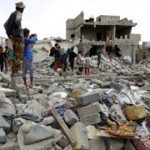At the beginning of July, a Yemeni activist wrote on Twitter: “We in #Yemen are no strangers to war, but we've never witnessed anything like terror & desperation of past 100 days. We won't forget.” July 2 marked 100 days since the beginning of the intervention in Yemen by the Saudi-led coalition to stamp out the Houthi rebellion in the country. Unlike some of the other conflicts in the Middle East, Western press and political leaders have treated this ongoing onslaught with near radio silence.
The only practical solution to ending the desperation in Yemen is an immediate end to the Saudi-led bombardment and blockade of the country. Yet, Saudi Arabia continues to flex its military muscle in a game of geopolitical chess in order to punish Iran, a backer of the Houthi rebels. And the international community is sitting idly by as the horrific number of casualties grows; Yemeni civilians are paying the price for the world’s silence and inaction.
For more than 100 days now, Saudi Arabia has systematically inflicted collective punishment on civilians and used starvation as a weapon of war. The Saudi-led coalition’s blockade of Yemen has prohibited humanitarian aid from entering the country and has restricted civilians’ ability to flee the fighting. Equally disturbing is the deliberate targeting of health care facilities in Yemen – a trend that Physicians for Human Rights has seen at egregious levels in Syria. Yemeni civilians have little choice but to remain in their homes and hope that the war ends before they die from hunger, thirst, or airstrikes. Despite these egregious violations of international humanitarian law, the United States has expanded its role in the Saudi-led campaign.
International humanitarian organizations have expressed their alarm over the rapidly growing humanitarian crisis. According to UNHCR, the three and a half months of conflict have killed over 1,500 Yemeni civilians, wounded some 3,600 people, caused 200,000 civilians to flee as refugees, and led to the internal displacement of more than one million. OCHA has also published alarming numbers: 21 million people – 80 percent of the country’s population – now need humanitarian assistance. This month, the UN emergency relief coordinator added Yemen to its Level Three emergency response list, joining Syria, Iraq, and South Sudan as the world’s most severe, large-scale humanitarian crises. To put this in perspective, in just three months, Saudi Arabia’s bombardment and blockade of Yemen has created a humanitarian disaster nearing the scale of Syria’s four-year old humanitarian catastrophe.
Dozens of humanitarian and human rights organizations have called for ceasefires, an end to the blockade, an end to arms transfers, and increased humanitarian funding. UN Secretary General Ban Ki-moon has also recognized the urgency of the situation, warning that, “Yemen’s very existence hangs in the balance.” As long as the international community lacks a coordinated response to the conflict, Yemeni suffering will only increase, along with security risks for the future.
Saudi Arabia is carrying out mass atrocities in Yemen with tacit support from the United States, its chief ally. The U.S. and its allies would do better to use its influence to put political pressure on Saudi Arabia and end impunity around the persecution of Yemeni civilians and the targeting of health care facilities. If the United States and the international community continue to sit idly by as its allies commit war crimes and Yemen spirals deeper into crisis, they too become complicit in potential Saudi war crimes. It is time to end the silence and ensure Yemeni civilians receive the protections they so deserve.

